Euthanasia is the practice of intentionally ending life to eliminate pain and suffering.

Assisted suicide – sometimes referred to as medical aid in dying – means a procedure in which people take medications to end their own lives with the help of others, usually medical professionals. The term usually refers to physician-assisted suicide (PAS), which is an end of life measure for a person suffering a painful, terminal illness. Once it is determined that the person's situation qualifies under the physician-assisted suicide laws for that location, the physician's assistance is usually limited to writing a prescription for a lethal dose of drugs.
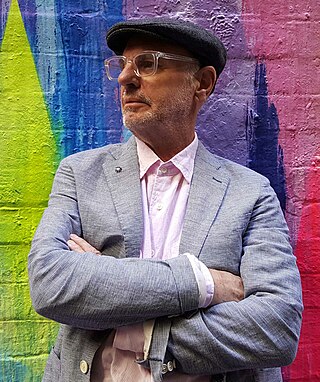
Philip Haig Nitschke is an Australian humanist, author, former physician, and founder and director of the pro-euthanasia group Exit International. He campaigned successfully to have a legal euthanasia law passed in Australia's Northern Territory and assisted four people in ending their lives before the law was overturned by the Government of Australia. Nitschke was the first doctor in the world to administer a legal, voluntary, lethal injection, after which the patient activated the syringe using a computer. Nitschke states that he and his group are regularly subject to harassment by authorities. In 2015, Nitschke burned his medical practising certificate in response to what he saw as onerous conditions that violated his right to free speech, imposed on him by the Medical Board of Australia. Nitschke has been referred to in the media as "Dr Death" or "the Elon Musk of assisted suicide".
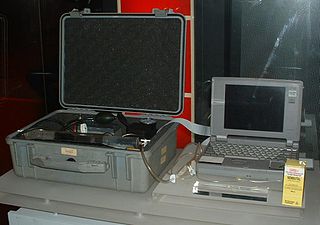
The Rights of the Terminally Ill Act 1995 (NT) was a controversial law legalising euthanasia in the Northern Territory of Australia, which was passed by the territory's Parliament in 1995. The Act was passed by the Northern Territory Legislative Assembly on 25 May 1995 by a vote of 15 to 10, received the Administrator's assent on 16 June 1995, and entered into force on 1 July 1996. A year later, a repeal bill was brought before the Northern Territory Parliament in August 1996, but was defeated by 14 votes to 11.
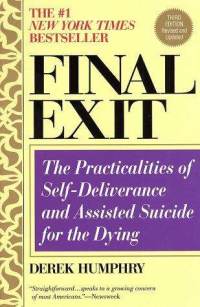
Final Exit: The Practicalities of Self-Deliverance and Assisted Suicide for the Dying, often shortened to just Final Exit, is a 1991 book written by Derek Humphry, a British-born American journalist, author, and assisted suicide advocate who co-founded the now-defunct Hemlock Society in 1980 and co-founded the Final Exit Network in 2004. The book was first published in 1991 by the Hemlock Society US in hardback. The following year, its 2nd edition was published by Dell in trade paperback. The current updated edition was published in 2010.
Voluntary euthanasia is the ending of a person's life at their request in order to relieve them of suffering. Voluntary euthanasia and physician-assisted suicide (PAS) have been the focus of intense debate in recent years.

Nancy Crick was an Australian woman who committed suicide by drinking a solution of Nembutal, while surrounded by 21 voluntary euthanasia supporters and family. Nancy was supported in her decision by euthanasia activist Dr. Philip Nitschke. Nancy's death became highly politicised after her autopsy results were leaked to the media. This was because the autopsy showed that at that the time of her death, Nancy was 'cancer free' but had an inoperable bowel condition that may have been the cause of her suicide-inducing pain.
The World Federation of Right to Die Societies is an international federation of associations that promote access to voluntary euthanasia. It holds regular international meetings on dying and death.

Dignity in Dying is a United Kingdom nationwide campaigning organisation. It is funded by voluntary contributions from members of the public, and as of December 2010, it claimed to have 25,000 actively subscribing supporters. The organisation declares it is independent of any political, religious or other affiliations, and has the stated primary aim of campaigning for individuals to have greater choice and more control over end-of-life decisions, so as to alleviate any suffering they may be undergoing as they near the end of their life.
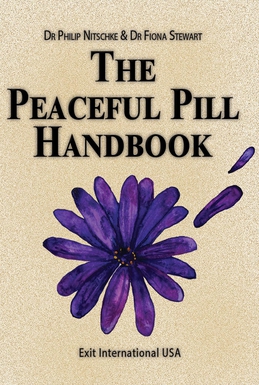
The Peaceful Pill Handbook is a book setting out information on assisted suicide and voluntary euthanasia. Written by the Australian doctor Philip Nitschke and lawyer Fiona Stewart, it was originally published in the U.S. in 2006. A German edition of the print book—Die Friedliche Pille—was published in 2011. A French edition—La Pilule Paisible—was published in June 2015. An Italian edition—La pillola della quiete—was published in 2018.
A euthanasia device is a machine engineered to allow an individual to die quickly with minimal pain. The most common devices are those designed to help terminally ill people die by voluntary euthanasia or assisted suicide without prolonged pain. They may be operated by a second party, such as a physician, or by the person wishing to die. There is an ongoing debate on the ethics of euthanasia and the use of euthanasia devices.
Suicide tourism, or euthanasia tourism, is the practice of potential suicide candidates travelling to a jurisdiction to die by suicide or assisted suicide which is legal in some jurisdictions, or the practice of travelling to a jurisdiction in order to obtain drugs that can aid in the process of ending one's own life.
Euthanasia became legal in New Zealand when the End of Life Choice Act 2019 took full effect on 7 November 2021. It is illegal to "aid and abet suicide" under Section 179 of the New Zealand Crimes Act 1961. The clauses of this act make it an offence to "incite, procure or counsel" and "aid and abet" someone else to commit suicide, regardless of whether a suicide attempt is made or not. Section 179 covers both coercion to undertake assisted suicide and true suicide, such as that caused by bullying. This will not change under the End of Life Choices Act 2019, which has provisions on coercion of terminally ill people.

Laws regarding euthanasia or assisted suicide in Australia are matters for state and territory governments. As of November 2023 all states have implemented legislation creating an assisted suicide scheme for eligible individuals. These laws typically refer to assisted suicide as "voluntary assisted dying".
A suicide bag, also known as an exit bag or hood, is part of a euthanasia device consisting of a large plastic bag with a drawcord used to die by suicide through inert gas asphyxiation. It is usually used in conjunction with a flow of an inert gas that is lighter or less dense than air, like helium or nitrogen. Continuing to breathe expels carbon dioxide and this prevents the panic, sense of suffocation and struggling before unconsciousness, known as the hypercapnic alarm response caused by the presence of high carbon dioxide concentrations in the blood. This method also makes the direct cause of death difficult to trace if the bag and gas canister are removed before the death is investigated. While asphyxiation by helium can be detected at autopsy, there is currently no test that can detect asphyxiation by nitrogen. For this reason, nitrogen is commonly the preferred choice for people who do not want the cause of death established.
YourLastRight.com Limited is an Australian national non-profit organisation which lobbies for law reform to permit voluntary euthanasia in restricted circumstances. In August 2012 the West Australian Voluntary euthanasia Society withdrew from the body claiming funding mismanagement and concern over attempts by YourLastRight CEO Neal Francis to initiate defamation proceedings against Exit International and Dr Philip Nitschke for questioning how YourlastRight was spending the Clem Jones bequest funding.
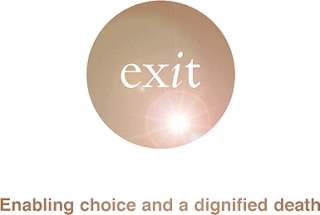
Exit is a not-for-profit, pro-euthanasia organisation based in Scotland that lobbies for and provides information about voluntary euthanasia and assisted suicide. It has particularly focused on research and publication of works which provide information about suicide methods, including How to Die With Dignity, the first book published on the subject.
The Voluntary Euthanasia Party (VEP) was a minor political party in Australia, founded in early 2013 by Corey McCann to advocate for legislative change to allow voluntary euthanasia in Australia. The party's inception was strongly supported by Dr Philip Nitschke, director of Exit International and Richard Mills, then President of Dying with Dignity NSW.
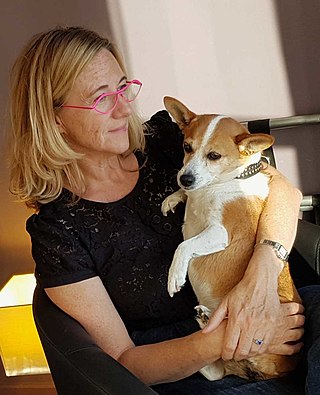
Fiona Stewart is an Australian lawyer, sociologist, author and former executive director of the pro-euthanasia group Exit International (2004-7). She is author of Killing Me Softly: Voluntary Euthanasia and the road to the Peaceful Pill and co-author of The Peaceful Pill Handbook. Stewart authored the Peaceful Pill Handbook series.

The Sarco pod is a euthanasia device or machine consisting of a 3D-printed detachable capsule mounted on a stand that contains a canister of liquid nitrogen to die by suicide through inert gas asphyxiation. "Sarco" is short for "sarcophagus". It is used in conjunction with an inert gas (nitrogen) which decreases oxygen levels rapidly which prevents panic, sense of suffocation and struggling before unconsciousness, known as the hypercapnic alarm response caused by the presence of high carbon dioxide concentrations in the blood. The Sarco was invented by euthanasia campaigner Philip Nitschke in 2017. Nitschke said in 2021 that he sought and received legal advice about the device's legality in Switzerland.











